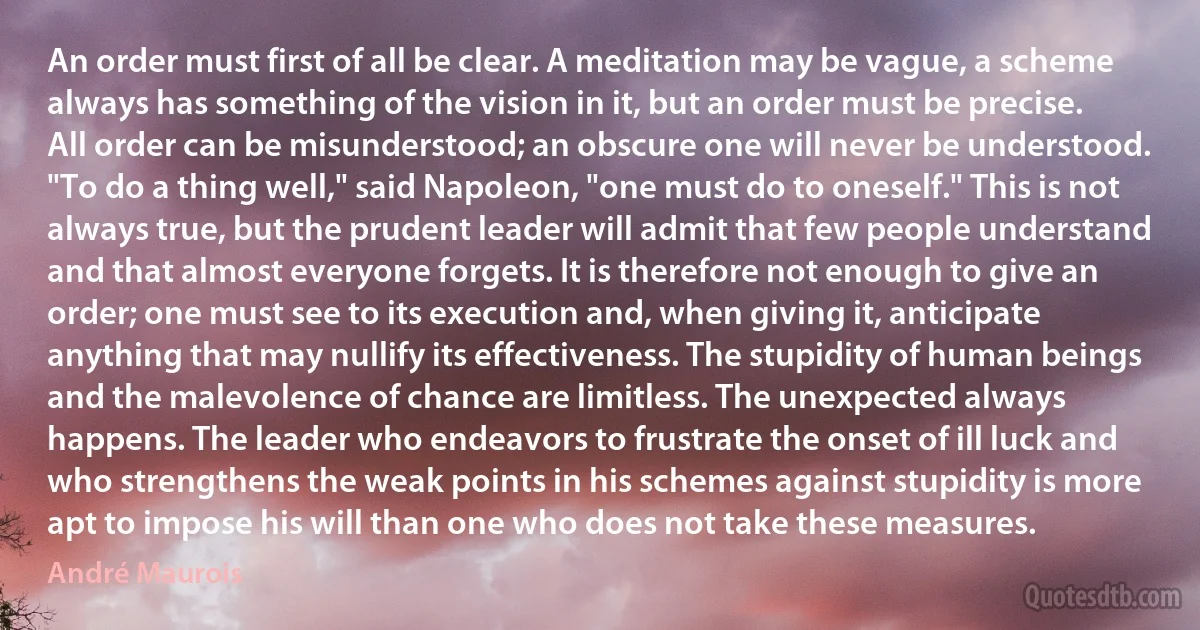
An order must first of all be clear. A meditation may be vague, a scheme always has something of the vision in it, but an order must be precise. All order can be misunderstood; an obscure one will never be understood. "To do a thing well," said Napoleon, "one must do to oneself." This is not always true, but the prudent leader will admit that few people understand and that almost everyone forgets. It is therefore not enough to give an order; one must see to its execution and, when giving it, anticipate anything that may nullify its effectiveness. The stupidity of human beings and the malevolence of chance are limitless. The unexpected always happens. The leader who endeavors to frustrate the onset of ill luck and who strengthens the weak points in his schemes against stupidity is more apt to impose his will than one who does not take these measures.
André MauroisRelated topics
almost anything chance clear effectiveness enough everyone few giving human ill impose leader luck malevolence napoleon order people say see something stupidity take thing vague vision well pointsRelated quotes
The time has not yet come for dealing with the world illusion on a large scale, for the race is not adequately mental nor has the illusion (which is, as I have stated, pre-eminently the result of the misinterpretation of ideas) reached its height. But the hour has struck for the first steps to be taken in the dissipation of glamour, and the hold of glamour upon the race should be appreciably lessened in the future. Hence the practical training now being given in this group in their own lives; hence also the intended teaching later to be given to the group-if they measure up to the opportunity-which will enable them to aid in the concerted and planned attack upon the world glamour. Wrestle therefore with your personal problems along these lines, my brothers, for in this way you will gain facility in discernment, in clear precise action, and in strengthened understanding.

Alice Bailey
It's as if someone were out there making up pointless jobs just for the sake of keeping us all working.... Hell is a collection of individuals who spend their time working on a task they don't like and are not especially good at.... Give them a few drinks, and they will launch into tirades about how pointless and stupid their job really is.... Nurses, garbage collectors, mechanics, it's obvious were they to vanish, results would be catastrophic.... A world without teachers or dock-workers would soon be in trouble.... It's not clear how humanity would suffer were all private equity CEOs, lobbyists, PR researchers, actuaries, telemarketers, bailiffs or legal consultants to similarly vanish.... Real productive workers are squeezed and exploited. The remainder are unemployed and a larger stratum paid to do nothing.

David Graeber
The first intellectual operation in which I arrived at any proficiency, was dissecting a bad argument, and finding in what part the fallacy lay; and though whatever capacity of this sort I attained was due to the fact that it was an intellectual exercise in which I was most perseveringly drilled by my father, yet it is also true that the school logic, and the mental habits acquired in studying it, were among the principal instruments of this drilling. I am persuaded that nothing, in modern education, tends so much, when properly used, to form exact thinkers, who attach a precise meaning to words and propositions, and are not imposed on by vague, loose, or ambiguous terms. The boasted influence of mathematical studies is nothing to it; for in mathematical processes, none of the real difficulties of correct ratiocination occur.

John Stuart Mill
I'm against these aggressive tax avoidance schemes but I'm not just against them, this Government has taken a huge amount of steps to legislate and toughen the laws and go after aggressive tax avoidance schemes for the very simple reason that if people go after these schemes and aggressively avoid tax they're making it the case that everyone else has to pay higher taxes as a result so I think we should be very clear, tax evasion is illegal and for that you can be prosecuted, you can go to prison for tax evasion. Tax avoidance is in these cases, very aggressive tax avoidance schemes, they are wrong and we should really persuade not to do them and that's why we have these court cases where the court looks at whether a scheme is really about avoiding tax rather than anything else and the court was very clear in this case.

David Cameron
The point to be made clear is that, whatever may be our temperament, or our power in the presence of nature, we have to render what we actually see, forgetting everything that appeared before our own time. Which, I think, should enable the artist to express his personality to the full, be it large or small. Now that I am an old man, about seventy, the sensations of colour which produce light give rise to abstractions that prevent me from covering my canvas, and from trying to define the outlines of objects when their points of contact are tenuous and delicate; with the result that my image or picture is incomplete. For another thing, the planes become confused, superimposed; hence Neo-Impressionism (initiated by Seurat and Paul Signac, ed., where everything is outlined in black, an error which must be uncompromisingly rejected. And nature, if consulted, shows us how to achieve this aim.

Paul Cézanne
